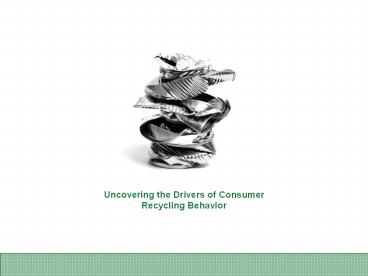Uncovering the Drivers of Consumer Recycling Behavior - PowerPoint PPT Presentation
1 / 22
Title:
Uncovering the Drivers of Consumer Recycling Behavior
Description:
Identify how we can increase the understanding of, belief in and participation ... Journaling prior to visit. 27 in-depth interviews. Sample journal pages... – PowerPoint PPT presentation
Number of Views:56
Avg rating:3.0/5.0
Title: Uncovering the Drivers of Consumer Recycling Behavior
1
Uncovering the Drivers of Consumer Recycling
Behavior
2
Objectives
- Identify how we can increase the understanding
of, belief in and participation in recycling
among consumers throughout the country - Determine how we can get those who are recycling
occasionally to recycle more often, more
consistently and encourage others to do the same
3
Where Did We Start?
- What do we currently know about recyclers and the
motivation to recycle? - How does what participants report about their own
behavior conflict with what they actually do? - Where are the gaps in our knowledge of the values
that underlie this behavior?
4
Secondary Research Audit Objectives
- Uncover what is already known about recycling
behaviorin the U.S. - Examine factors among consumer behaviors that can
be influenced by communications - Define the target audience and differentiate
between the sometimes recyclers and the
always and never recyclers
5
Positive Rational Drivers of Recycling Behavior
- Belief that advantages outweigh the disadvantages
- Recycling is more a matter of right and wrong
than of costs and benefits - Social Pressure
- Expectations of others is important, however
- Less important than internal facilitators such
as personal commitment to recycling
6
Positive Drivers of Recycling Behavior
- Behavior is consistent with self-image
- Always recyclers aspire to values like a sense
of accomplishment, inner harmony and self respect - Sometimes recyclers do not see themselves as a
typical recyclers - Recycling activities appeal to both community
interest (altruism) and self-interest - Sometimes Recyclers
- want to feel connected to others
- need to believe that their efforts make a
tangible difference - desire to support a healthy environment (though
they dont know how)
7
Barriers to Recycling Behavior
- Lack of knowledge
- Perceived barriers
- Lack of time, lack of space for storage, pest
concerns, messiness, difficulty moving the bin to
the curb, inconvenient drop-off sites
8
Potential Influence of Communications Tactics
- Educational programs that include individual
behavioral commitments are more effective than
simply informing people about conservation
opportunities - Positively framed messages manifest a
significantly higher level of belief and a more
favorable attitude - Communication about recycling is more effective
when it is vivid, concrete and personal
9
Primary Research What Did We Want to Know?
- What are the factors that contribute to the
sometimes recycler NOT recycling? (Material
type? Location? Social factors? Situational
factors?) - To what degree do we need to educate sometimes
recyclers? - Do sometimes recyclers have trouble connecting
the act of recycling to the ways it benefits
society? - Sometimes recyclers do not picture themselves
as the typical recycler. What is their image of
the typical recycler and how can we help them
adopt a self-image that is consonant with
consistent recycling?
10
MethodologyWhy Ethnography?
- Three issues should be considered when
researching recycling behavior - Good behavior is often overstated in traditional
research (e.g., flossing, exercise) - Recycling behavior is most entrenched at home
among family members - Local influences (neighbors, communities) have a
significant effect on recycling behavior, shaping
both attitudes (through setting community
standards) and actions (through infrastructure)
11
DDB Life Style Study
12
Ethnographic Process/Methodology
13
Sample journal pages
14
Both have a common value foundation that is
driven by the desire to do goodfor others and
their own self-image
15
But Sometimes Recyclers often marginalize
recycling because it doesnt give them immediate
feedback/gratification
Rational Questions from Sometimes Recyclers
Where do recycled items go? I want to make a
direct impact does recycling do that? Is
recycling even happening? If I cant see it, how
am I supposed to believe it? Is going the extra
mile even worth it? Whats the difference of one
bottle or can?
16
The environment was often the quickest and most
convenient response to Why do you recycle?
- Mentioned equally by Sometimes and Always
Recyclers - so why not equally motivating?
- Seemed to be more of a feel-good reinforcement
of existing behavior rather than a
behavior-inducing driver - When asked What if your recycling infrastructure
(the bins) were removed?, Suddenly the
environment and the future werent so important.
Yeah, then I just probably wouldnt recycle. It
wouldnt be worth the hassle. Sometimes
Recycler, Boston
17
But the environment lacks personal relevance for
Sometimes Recyclers
18
Always Recyclers are more motivated because
they connect the dots between their recycling
effort and emotional drivers
19
Ethnography Key Findings
- Always and Sometimes Recyclers have key
values in common - However, concern for the environment isnt the
primary driver - Its the emotional connections (not rational
facts) that create the habit of recycling - The key is to align existing values with recycling
20
What A Campaign Needs to Do
21
Insights for Creative Development
I do it, because it needs to get done. And I
know that. And others can see that I know that.
(internal)
I do it because I want people to look up to me,
and I lead by example. (external)
Accomplished
Role Model
OPTIMISM
I do it because its one of the few ways I know
my actions make a real difference.
I do it because its going to work.
Control
Belief
22
What Do We Need the Creative to Do?
- To make our target feel
- Optimistic
- Connected
- Accomplished
- In short, to make the act of recycling an act of
optimismof connection to the communityand to
create the feeling of accomplishment when the
behavior is practiced































